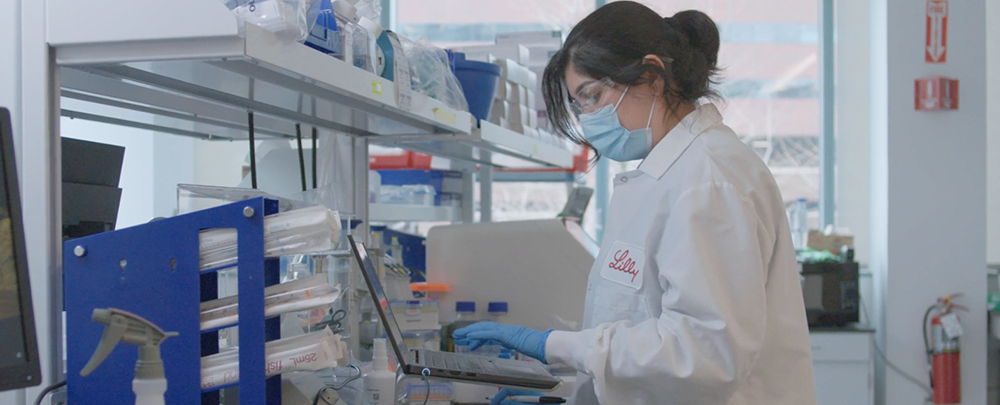You Have Questions About Genetic Medicine -- Lilly Has Answers
April 5, 2022 Posted by: Eli Lilly and Company

As part of our efforts to advance RNA and DNA-based medicines -- and building on the acquisition and expansion of Prevail Therapeutics -- we have launched the Lilly Institute for Genetic Medicine, including a new facility in the Boston Seaport with a $700 million investment. Researchers working to develop genetic medicines in Boston and New York will leverage novel technologies with the potential to treat or even prevent diseases in a manner not possible with traditional medicines. The Institute will further fuel the development of these genetic medicines, which already account for more than 20 percent of Lilly's diabetes, immunology and central nervous system research portfolio. But what does this innovation mean?
What is genetic medicine?
Many diseases are caused when certain genes or gene circuits do not function correctly, or at all, causing disorders such as diabetes, neurodegeneration and cancer. Genetic-based therapies, including siRNA and gene therapies, target the root causes of these diseases and provide an opportunity to specifically correct these mistakes by addressing the proteins that lead to these diseases.
Traditional medicines, including those made here at Lilly, have typically been made from small or large molecules. Small molecule therapies are usually taken orally and include medicines such as aspirin and antibiotics. Large molecules, including peptides are usually injected and made from biological building blocks, amino acids. “In contrast, genetic medicines act at the nucleic acid level, typically using agents that interact with RNA or DNA to treat or cure a disease by restoring normal function of the targeted gene,” explained Andrew Adams, co-director of the institute and vice president of Genetic Medicines and Neurodegeneration Research.
Over the past several decades, simply reaching the intended target was a significant challenge for any neurological medication, due in part to the presence of the blood-brain barrier. Advances in gene therapy, gene editing and siRNA technology may allow for the efficient and widespread delivery of medicines to the central nervous system.
"Genetic medicine for neurodegenerative disorders could help a population of people with no available therapies to modify the relentless progressive course of their disease,” Adams said.
Want more details about the Lilly Institute for Genetic Medicine?
What's the potential of genetic medicine?
“One unique feature of genetic medicine is the potential for extremely infrequent dosing -- think one or twice a year vs. once a day or week with traditional approaches,” Adams said. “This durability of effect means that treatments can be less frequent, allowing for improved patient experiences, better compliance and the potential for improved long-term outcomes. In many cases, there is even the possibility for a ‘one and done’ treatment for diseases today that lack effective treatments.”
"Gene therapy gives us the ability to correct gene function in patients -- and provides hope for patients with conditions such as Parkinson's disease, Gaucher disease, frontotemporal dementia, Alzheimer's disease, ALS and other neurodegenerative disorders," said Michael Hutton, vice president of Neurodegeneration Research. "Especially in diseases with a validated genetic component, genetic medicines will allow us to treat targets with a high likelihood of success.”
How are Lilly and Prevail are working together?
Prevail Therapeutics, based in New York City and acquired by Lilly in 2021, is an independently operating company within Lilly. Prevail is a leading pioneer in gene therapy, developing a pipeline of treatments to slow or stop the progression of Parkinson’s disease and other neurodegenerative diseases. Combining Lilly’s neuroscience expertise with Prevail’s strength in gene therapy, we can potentially treat a larger range of diseases. “The institute allows for even greater synergies between our teams, building things like innovative delivery solutions for many of our novel therapeutic modalities,” said Adams, a comment echoed by Franz Hefti, CEO of Prevail and co-director of the institute. “The institute will integrate our efforts from early technologies to clinical development and allow us to move critical programs forward at maximal speed,” Hefti said.
Why Boston?
In five years, Lilly expects our Boston team to grow from 120 to more than 250 researchers in biology, chemistry, and data science; the New York group will expand to 200 scientists, all Lilly employees. We’re also creating a shared space to support biotech startups in the Boston area -- providing dedicated and configurable lab and office space, access to Lilly scientists, and collaboration opportunities.
Lilly’s already-established Cambridge Innovation Center focuses on device innovation and next-generation therapeutics. Located in the heart of the burgeoning science and technology cluster in the Boston area, both facilities are close to some of the world's best academic and industrial innovators.
There is also a robust push to increase diversity, equity and inclusion in Boston's workforce and the growing biopharma and life sciences industry in the Boston area. “We believe diversity serves as a catalyst for innovation and creativity,” Adams said. “By embracing the varied backgrounds of our employees, we can better deliver scientific breakthroughs.”